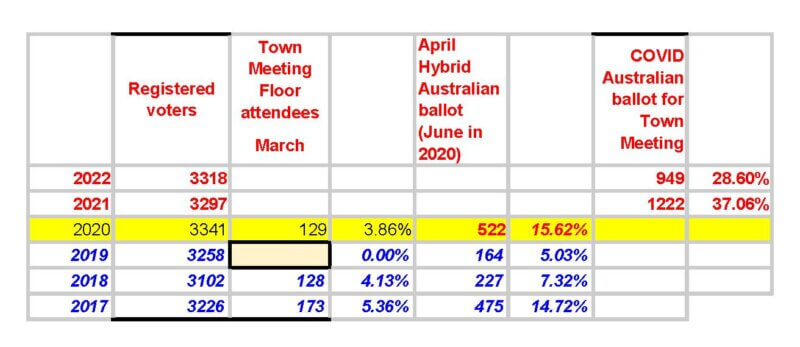Charlotte Selectboard cancels March 2 in-person town meeting
All voting to be by Australian ballot again this year
Those who love Vermont’s unique tradition of direct participatory democracy will be disappointed in Charlotte again this year, while those who support having the largest number of residents decide major issues like the town’s budget should be happy.
On Monday, Jan. 29, the selectboard voted to cancel the town’s scheduled in-person town meeting on March 2 at Charlotte Central School. This special selectboard meeting came after a motion to cancel this town meeting failed by a 2-2 tie vote of the selectboard at its regular meeting the Monday before, Jan. 22.
At the Jan. 22 meeting, board member Louise McCarren had left because of illness when the vote was taken, so there wasn’t a fifth vote to break the tie.
On Jan. 29, chair Jim Faulkner made a motion to reconsider the previous week’s motion about whether this year’s voting should be in person or by Australian ballot. As they had the week before, Faulkner and Kelly Devine voted again to forego the in-person, voice-voting town meeting this year. McCarren joined them in voting to cancel the town meeting on March 2.

Participation in Town Meeting Day and Australian ballot voting.
As supporters of the in-person March 2 meeting, Lewis Mudge and Frank Tenney voted against the motion.
So, all Charlotte voting this year will again be by Australian ballot, and this voting will take place along with most of Vermont on Town Meeting Day, Tuesday, March 5.
There hasn’t been a traditional in-person town meeting in Charlotte since 2020. That town meeting came just before the pandemic shut down large gatherings. After the quarantine came, the state Legislature voted to temporarily grant towns the right to cancel in-person town meeting because of the threat of COVID transmission. This is presumably the last year that the town’s selectboard can vote to suspend in-person town meetings, although that might be changed by the Legislature.
Mudge said his understanding is that, if Charlotte doesn’t hold a traditional town meeting this year, it will have to next year. In fact, he said, that when the selectboard voted not to hold in-person town meeting last year, the members of the board made a commitment to the town to hold an in-person town meeting this year.
It was a controversial decision last year when the board voted to suspend in-person town meeting for 2023, with a very vocal group of people criticizing the selectboard about the decision.
This year, the audience at the selectboard meeting was largely in favor of canceling the 2024 town meeting. The most common reason given by those who spoke in favor of Australian ballot over voice voting was that more people vote by Australian ballot than show up for a town meeting.
Another frequent reason given was that many expect the turnout for the in-person town meeting to be small because Saturday, March 2, comes during the last weekend of the schools’ winter break. It is widely expected that attendance will be low with many residents out of town for a winter vacation.
Faulkner said he supported using an Australian ballot exclusively to decide town issues because so many more people participate then.
“Something like 900 people participate when we use an Australian ballot,” Faulkner said. “When the town has an in-person town meeting, 150, maybe 200 people on the best days, participate. That’s a big difference.”
Tenney pointed out that the town voted for having an in-person town meeting by Australian ballot in 2020, just before COVID shut things down. So, Charlotte has never had a Saturday in-person town meeting the voters wanted then and approved via the voting method being touted as the most valid way for determining what residents want.
Having town meeting on the Saturday before the state’s official Town Meeting Day on the first Tuesday in March was discussed for three years, Tenney said. “It’s not something that was just talked about and we said, ‘Hey, do you want to do it on a Saturday?’”
Chea Evans, Charlotte’s representative, said, if the town wants to permanently switch to having all voting by Australian ballot, that decision would have to be made at an in-person town meeting.
Such a change has to be made by a town’s current method of voting, which for the time being is town meeting in Charlotte, even though there hasn’t been a town meeting since 2020.
Some people argue for town meeting because it gives residents a big hand in deciding things like a budget since the budget can be amended from the floor, Peter Joslin said. He told the selectboard he was a strong supporter of the Australian ballot because it gives so many more people the opportunity to vote, and residents have had ample opportunities to make suggestions about the budget at the many selectboard meetings when the budget has been discussed.
Rick Lunt said, because only around 5 percent of the residents participate in town meeting and are deciding the budget for the other 95 percent of residents, it is taxation without representation: “We had a war about this with the British.”
